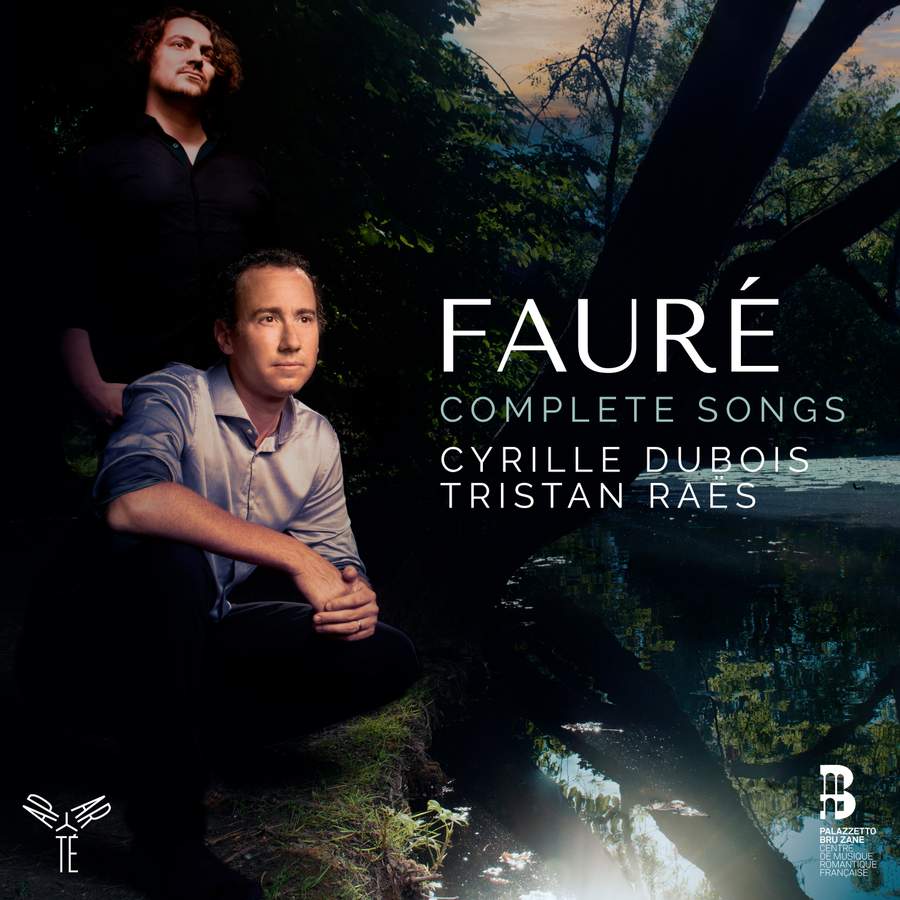FAURÉ Complete Songs (Cyrille Dubois, Tristan Raës)
View record and artist detailsRecord and Artist Details
Genre:
Vocal
Label: Aparte
Magazine Review Date: 08/2022
Media Format: CD or Download
Media Runtime: 231
Mastering:
DDD
Catalogue Number: AP284

Author: Mark Pullinger
Here’s a delicious treat that should have all lovers of French mélodies salivating. Complete sets of Gabriel Fauré’s songs are usually shared between singers, focused around a single pianist. Graham Johnson (Hyperion) and Malcolm Martineau (Signum) employ up to nine singers per disc in their respective recordings. Pairs of singers feature too. Martineau set down an earlier collection (CRD) with Sarah Walker and Tom Krause, and perhaps the most famous was Dalton Baldwin’s (EMI) featuring Elly Ameling and Gérard Souzay. Last seen on a Brilliant Classics reissue, it appears to be unavailable, which is simply criminal neglect.
But now, for the first time, all of Fauré’s mélodies have been recorded by a single singer – French tenor Cyrille Dubois with his longtime collaborator Tristan Raës on the Aparté label with the support of Palazzetto Bru Zane. It’s a considerable achievement – 103 songs across three discs – and one senses the dedication and love these artists imbue into these refined performances. Featuring a single voice across nearly four hours of music may affect the way you choose to listen. Recordings featuring multiple singers have the advantage of mixing up the aural palette, varying tone colours, an option not available to the single performer. I found dipping in and out the best way, but the rewards were great and this deserves to join the ranks of Ameling and Souzay.
Dubois and Raës have programmed the three discs intelligently. Rather than a chronological survey – as largely done on Baldwin’s set – they have created three ‘recitals’, as it were, mixing early, middle and late repertoire. In a booklet note, they claim there is no valid reason why one singer cannot perform songs written for a different voice and explain how they adopted new transpositions that respect the original key sequences in some of Fauré’s cycles. The booklet also features an excellent essay by Nicolas Southon charting the history of the mélodie, and Fauré’s choice of texts during the different periods of their composition and how his stylistic world developed. Aparté’s presentation is excellent, with full texts and translations.
I’ve had the pleasure of reviewing Dubois in our Opera section several times: Iopas on John Nelson’s Gramophone Awards Recording of the Year Les Troyens (Erato, 12/17); an outstanding Nadir in The Pearl Fishers (Pentatone, 8/18 – Recording of the Month); and a charming Fortunio at the Opéra-Comique (Naxos, 12/20). He has an instantly recognisable voice – very light, almost an haute-contre, honeyed, with a slight flutter that warms his tone and gives a gentle sense of vulnerability. Dubois’s diction is superb. He uses a lot of head voice here and is miked very closely, so there is a real sense of intimacy that comes through the speakers, as if he and Raës are there in your living room giving a salon performance. With so many songs about moonlight, it makes for splendid late-night listening.
Raës is every inch the poet at the piano, always sensitive to the text. His pacing is often more urgent than Baldwin’s, such as the flowing tempo taken for ‘Dans les ruines d’une abbaye’. The piano sound is clear, if a little more distant than Dubois in the balance.
There are very few tenor recordings of Fauré mélodies available, but I listened to Yann Beuron’s recording with Billy Eidi (Timpani) for comparisons. As charming as Beuron is, Dubois’s lighter tenor and agility pay off in numbers such as ‘Mandoline’ or the Madrigal from Shylock. Favourites such as ‘Après un rêve’ and ‘Chanson d’amour’ stand up well to any competition on disc – although I will always reserve a special place in my heart for the divine Sabine Devieilhe (Erato, A/20) – and the third verse of ‘Clair de lune’ is aural balm.
Of the song-cycles, La bonne chanson is particularly mellifluous, with ‘Puisque l’aube grandi’ sounding especially yearning, and there’s a fine sense of emotion in L’horizon chimérique, Fauré’s final cycle, composed in the autumn of 1921. Dubois is beguiling in the latter’s third song, ‘Diane, Séléné’, where he makes time stand still in the opening phrases of the second verse.
But what of something like La chanson d’Ève, composed for female voice? In this transposition it sits well for his voice, even though his longer-held high notes sung in such a light head voice have the danger of slipping into crooning in songs such as ‘Crépuscule’. But I find it’s always applied tastefully – indeed, there’s never anything untasteful about a Dubois performance. He is a stylish, cultured performer and is as fine an advocate for Fauré’s mélodies as any of the best. Recommended for those who love indulging in French song at its finest.
Explore the world’s largest classical music catalogue on Apple Music Classical.
Included with an Apple Music subscription. Download now.

Gramophone Digital Club
- Digital Edition
- Digital Archive
- Reviews Database
- Full website access
From £8.75 / month
Subscribe
Gramophone Full Club
- Print Edition
- Digital Edition
- Digital Archive
- Reviews Database
- Full website access
From £11.00 / month
Subscribe
If you are a library, university or other organisation that would be interested in an institutional subscription to Gramophone please click here for further information.




